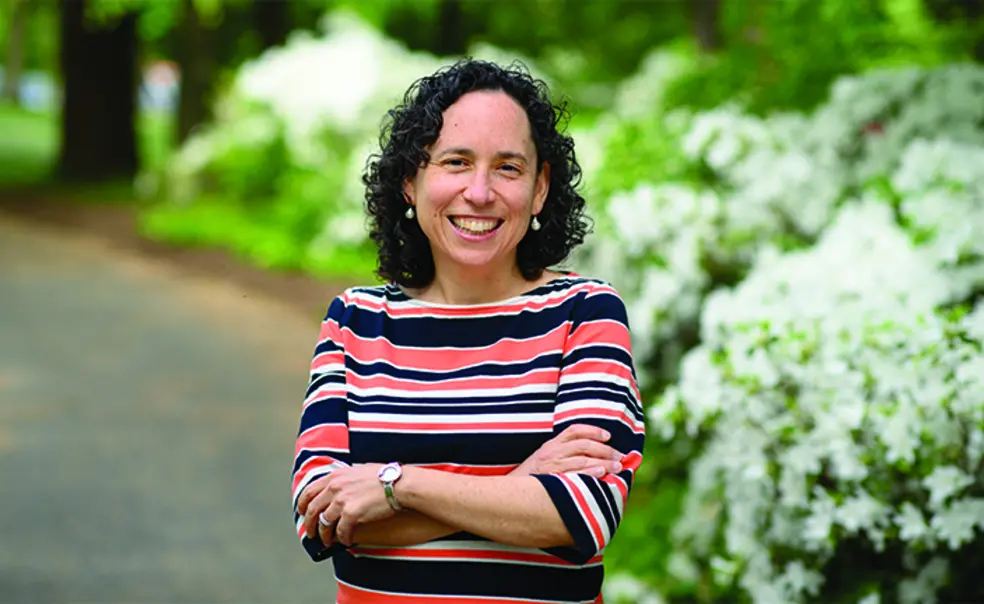Q&A: Rabbi Julie Roth Reflects on 17 Years of Chaplaincy
‘Being executive director of CJL has been one of the greatest blessings of my life’
After 17 years as the University’s Jewish chaplain and executive director of Princeton’s Center for Jewish Life (CJL) and the University’s Jewish chaplain, Rabbi Julie Roth is departing for a position as a pulpit rabbi in Montclair, New Jersey, at Shomrei Emunah, a 117-year-old synagogue known for its social-justice work. Roth — an honorary member of the Class of 2021 — spoke to PAW about the diverse Jewish community at Princeton, CJL’s interfaith programs, and antisemitism on campus.
How has the CJL grown and changed during your tenure?
The number of opportunities to enter into Jewish community and learning at Princeton has exploded. We are one of the best-resourced Hillels in the world, with three rabbis on staff, a full-time associate director, and an Israel fellow.
And we have a very diverse Jewish community. There’s a group for those who are Jewish and Latinx, one for those who are Jewish and Asian, an LGBTQJ group. It’s an ongoing, constructive effort to have Jews of diverse backgrounds all feel part of one community. Every Friday night, we have three Shabbat services — Reform, Conservative, and Orthodox — in the same building. And then we all join together, usually about 150 students, for one Shabbat dinner.
One of your priorities has been forging connections between Jewish and non-Jewish students.
Non-Jewish students regularly come to all of our programs, including our many travel programs. I am most proud of my long-term interfaith programming with Imam Sohaib Sultan, may his memory be a blessing. We led a joint Muslim-Jewish dialogue trip to Spain looking at the shared history of Muslims and Jews in the “Golden Age” when Spain was under Muslim rule. We also held a powerful conversation towards the end of Sohaib’s life about death and dying in the Muslim and Jewish traditions. And we taught a class together on leadership through the models of Moses and Mohammed.
There were two very visible antisemitic incidents near campus last year, when students wearing yarmulkes were heckled from passing cars. How are you addressing antisemitism?
In recent years there has been an increase in antisemitism in the United States and on college campuses, including at Princeton. It’s also been an opportunity for education and dialogue. I started holding workshops on antisemitism in January. We’ve had three so far, one for staff and administrators and two for students.
Sixty percent of religious hate crimes in America target Jews, though Jews are 2 percent of the population. Half of Americans say they have never heard of antisemitism or they don’t know what it means. There is a lack of knowledge out there, and for some, the sentiments are internalized unintentionally. In the workshops, we talk about Jewish identity. A lot of people don’t realize that 15 percent of Jews are Jews of color. We talk about the classic historical tropes of antisemitism, such as associating Jews with power and greed. We talk about the difference between criticism of Israel that is not antisemitic and criticism of Israel that is.
What’s your favorite memory of your time at the University?
Princeton had a conference in 2016 to celebrate 100 years of Jewish life at Princeton, and close to 900 alumni came back to campus for a multiday celebration. It was so powerful to hear stories across the generations. Princeton hasn’t always been a place where it was easy to be Jewish. Think about what it meant for CJL to be built in the center of campus, or for Harold Shapiro [*64] to become Princeton’s first Jewish president. As I look back, I know that being executive director of CJL has been one of the greatest blessings of my life.
Interview conducted and condensed by Jennifer Altmann












No responses yet